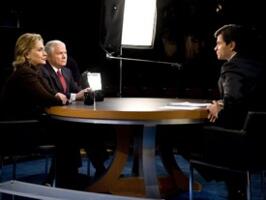Most Voters Expect Biased News Coverage of 2016 Presidential Race
In the wake of the George Stephanopoulos scandal, most voters doubt the accuracy of political news coverage and think most reporters will slant their coverage of the 2016 presidential campaign.
A new Rasmussen Reports national telephone survey finds that 61% of Likely U.S. Voters now do not trust the political news they are getting. That's a 16-point jump from 45% last October. Twenty-one percent (21%) still have confidence in the political coverage they get, but that's down from 33% in the earlier survey. Seventeen percent (17%) are not sure. (To see survey question wording, click here.)
When it comes to the 2016 presidential campaign, only 23% believe most reporters will try to offer unbiased coverage. Fifty-nine percent (59%) think that coverage will be slanted instead, with 36% who say most reporters will try to help Hillary Clinton during the campaign and 23% who say they will try to hurt her bid for the White House instead. Seventeen percent (17%) are not sure.
Three months before the 2012 presidential election, 74% of voters said most reporters when covering a political campaign try to help the candidate they want to win, consistent with surveying for several years prior to that. Fifty-one percent (51%) expected most reporters would try to help President Obama at that time, while only nine percent (9%) thought they would be biased in favor of his GOP opponent Mitt Romney. These findings were nearly identical to those just before Election Day in November 2008. At that time, 51% felt most reporters had tried to help Obama win the presidency, while only seven percent (7%) thought they had tried to help Republican candidate John McCain.
Forty-six percent (46%) of voters now think ABC should ban Stephanopoulos, a former high level Clinton administration official, from any programming related to the presidential campaign since Hillary Clinton is running for president. Thirty-four percent (34%) say they are less likely to believe the reporting on ABC News because Stephanopoulos failed to disclose the donations to the Clinton Foundation.
(Want a free daily e-mail update? If it's in the news, it's in our polls). Rasmussen Reports updates are also available on Twitter or Facebook.
The national survey of 1,000 Likely Voters was conducted on May 17-18, 2015 by Rasmussen Reports. The margin of sampling error is +/- 3 percentage points with a 95% level of confidence. Field work for all Rasmussen Reports surveys is conducted by Pulse Opinion Research, LLC. See methodology.
Forty-eight percent (48%) of voters think media bias is a bigger problem in politics today than big campaign contributions, but nearly as many (44%) see campaign cash as the larger problem.
Majorities of voters across most demographic groups do not trust the political news they are getting. Voters under 40 are slightly more trusting of the political news they get than their elders are.
Men are more likely than women to think most reporters will try to help Clinton, although neither expects the coverage to be unbiased.
Republicans and voters not affiliated with either major political party are more skeptical of political news coverage than Democrats are. Democrats are twice as likely as GOP voters to think most reporters will try to offer unbiased coverage.
Fifty-five percent (55%) of Republicans think Clinton will benefit from favorable media coverage, but just 17% of Democrats and 39% of unaffiliated voters agree. Thirty-five percent (35%) of Democrats think most reporters will try to hurt her campaign, a view shared by only 13% of Republicans and 20% of unaffiliateds.
Forty-two percent (42%) of voters who don’t trust the political news they are getting think most reporters will try to help Clinton; just 14% believe the media's coverage of the 2016 race will be unbiased. Among those who do trust political news coverage, 38% say most reporters will try to stay neutral, but nearly as many (35%) think they will try to help the Democratic frontrunner.
Stephanopoulos has been forced to step down as a moderator for one of the upcoming debates by Republican presidential hopefuls. Voters have long believed that journalists who serve as debate moderators show bias in their questioning.
Voters still turn to TV over the Internet when it comes to political news, but the gap is narrowing.
Thirty-seven percent (37%) of Americans believe the average media reporter is more liberal than they are. Eighteen percent (18%) consider that reporter more conservative.
A year ago, 69% said the news reported by the media is at least somewhat trustworthy, but that included only 20% who felt it was Very Trustworthy.
Additional information from this survey and a full demographic breakdown are available to Platinum Members only.
Please sign up for the Rasmussen Reports daily e-mail update (it’s free) or follow us on Twitter or Facebook. Let us keep you up to date with the latest public opinion news.
The national survey of 1,000 Likely Voters was conducted on May 17-18, 2015 by Rasmussen Reports. The margin of sampling error is +/- 3 percentage points with a 95% level of confidence. Field work for all Rasmussen Reports surveys is conducted by Pulse Opinion Research, LLC. See methodology.
Rasmussen Reports is a media company specializing in the collection, publication and distribution of public opinion information.
We conduct public opinion polls on a variety of topics to inform our audience on events in the news and other topics of interest. To ensure editorial control and independence, we pay for the polls ourselves and generate revenue through the sale of subscriptions, sponsorships, and advertising. Nightly polling on politics, business and lifestyle topics provides the content to update the Rasmussen Reports web site many times each day. If it's in the news, it's in our polls. Additionally, the data drives a daily update newsletter and various media outlets across the country.
Some information, including the Rasmussen Reports daily Presidential Tracking Poll and commentaries are available for free to the general public. Subscriptions are available for $4.95 a month or 34.95 a year that provide subscribers with exclusive access to more than 20 stories per week on upcoming elections, consumer confidence, and issues that affect us all. For those who are really into the numbers, Platinum Members can review demographic crosstabs and a full history of our data.
To learn more about our methodology, click here.





